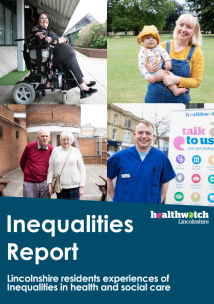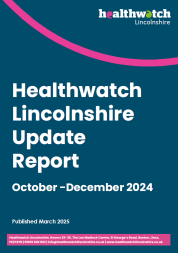Read what people had to say about health inequalities in Lincolnshire

What are health inequalities?
Health inequalities are avoidable, systematic differences in health between different groups of people. The term also refers to the differences in care that people receive and opportunities they have to lead healthy lives - both of which affect health status. Health inequalities can involve differences in, for example, access to care, life expectancy, quality of care and wider determinants of health such as geographical location or income (Kings Fund 2022).
Provision of equitable services is at the heart of the NHS Constitution. A key way to tackle health inequalities is to listen to people's experiences of care and how it can be improved. This at the heart of all our work. These experiences can then be shared to and considered by those who commission services.
How did we gather people's experiences of health inequalities?
As part of our 'COVID-19 One Year On' survey, we asked people in Lincolnshire whether there was any specific reason that had impacted on their ability to access Health and Care in an equitable manner. 336 people shared their experiences.
What did we find out?
Age was the biggest reason given for inequality.
47% felt age resulted in inequalities in health and care.
The vast majority of comments received related to patients feeling they were not receiving the care they required due being treated as 'senile'.
“You get to 60 and it seems your written off as things are age related and you have to ‘put up with it’ rather than being treated.”
However, we also heard the reverse of this, with several younger people feeling they were being overlooked, told they were ‘too young' to have the issues they were currently experiencing or implied that they were able to wait longer for help.
The next most frequently selected answers were having a long-term condition or disability. Socio-economic status and deprivation affect the likelihood of having a long-term condition or disability, and having a long-term condition or disability can be a barrier to the type and amount of work an individual can do. This in turn can then affect socio-economic factors and deprivation such as income and housing, creating a vicious cycle. All of this can have an additional damaging impact on health on top of the initial long-term condition or disability.
“Feels like oh you’ve got long term illness just get on with it and manage.”
For those with a disability, access to services was a key problem; for example, lack of wheelchair access or support for those with a sensory impairment. Several individuals highlighted the impact of being overweight on access to NHS services.
The final most frequently selected factor which cause inequalities in access to Health and Care services was geography. Lincolnshire is a predominantly rural county, with a relatively poor road network and public transport links. With individuals often having to travel long distances to services and use infrequent public transport to do so. For others in particularly rural parts of the county, public transport is not even available as an option. Respondents also discussed the considerable variation in services availability in the county.
“The infrastructure in Lincolnshire, roads and distances everyone is obliged to travel mean that we are not often able to access healthcare within 'the golden hour'.
What is being done to address health inequalities in Lincolnshire?
The final section of the report discusses what ourselves, Healthwatch Lincolnshire, and both NHS Lincolnshire's Integrated Care Board (ICB) and Better Lives Lincolnshire (Lincolnshire's Integrated Care System) are doing to tackle health inequalities in Lincolnshire.
A download link to the report is below. If you need the report in another format or would like to discuss anything, please email info@healthwatchlincolnshire.co.uk or call 01205 820 892.
For more background information on health inequalities have a look at this informative article from the Kings Fund: https://www.kingsfund.org.uk/publications/what-are-health-inequalities#what

